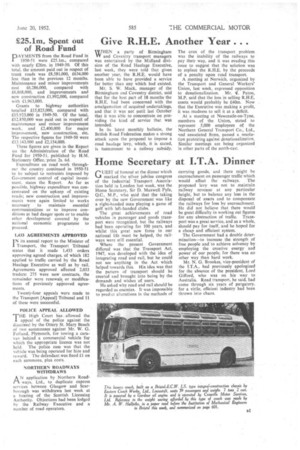Home Secretary at I.T.A. Dinner
Page 35

If you've noticed an error in this article please click here to report it so we can fix it.
GUEST of honour at the dinner which 1/4.1 marked the silver jubilee congress of the Industrial Transport Association held in London last week, was the Home Secretary, Sir D. Maxwell Fyfe, Q.C., M.P., who said that the taking over by the new Government was like a right-handed man playing a game of golf with left-handed clubs.
The great achievements of road vehicles in passenger and goods transport were recognized, but the railways had been operating for 100 years, and whilst this great new force in our national life must be helped, the railways were still essential.
Where the present Government differed was that the Transport Act, 1947, was developed with the idea of integrating road and rail, but he could not see anything in the Act which helped towards this. His idea was that the pattern of transport should be created and brought into being by the demands and wishes of users.
He asked why road and rail should be regarded as enemies. It was impossible to predict alterations in the methods of carrying goods, and there might be encroachment on passenger traffic which would affect the railways. The proposed levy was not to maintain railway revenue at any particular height, but to balance any loss in the disposal of assets and to compensate the railways for loss by encroachment. He did not believe that there would be great difficulty in working out figures for any abstraction of traffic. Transport was a great service, and as a whole, should pay for itself, and he hoped for a cheap and efficient system.
The Government had a double determination—to increase the strength of free people and to achieve solvency by employing the creative energy and power of our people, for there was no other way than hard work.
Mr. N. G. Brookes, vice-president of the I.T.A., had previously apologized for the absence of the president, Lord Gifford, who was on his way to Australia. Road transport, he said, had come through six years of purgatory, for a virile, efficient industry had been thrown into chaos.




















































































